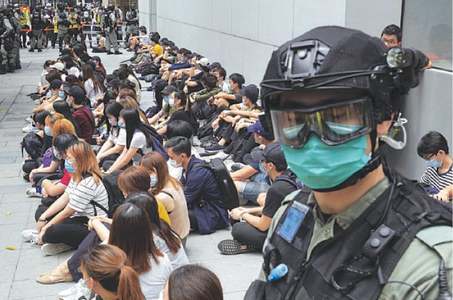China's parliament on Thursday overwhelmingly approved directly imposing national security legislation on Hong Kong to tackle secession, subversion, terrorism and foreign interference in a city roiled last year by months of anti-government protests.
The National People's Congress voted 2,878 to 1 in favour of the decision to empower its standing committee to draft the legislation, with six abstentions.
The legislators gathered in the Great Hall of the People burst into sustained applause when the vote tally was projected onto screens.
Only one person opposed the proposal, while six abstained.
The law would be directly imposed by mainland authorities, effectively bypassing Hong Kong's government.
According to a draft of the proposal released last week, the law would allow mainland security agencies to operate openly in Hong Kong.
The National People’s Congress Standing Committee — which is likely to meet next in June — will now be tasked with formulating the legislation, which Beijing has said must be done “at an early date”.
The Chinese government had last week tabled the law in the National People’s Congress. The parliament’s spokesman Zhang Yesui had said that the law would strengthen “enforcement mechanisms” in the financial hub.
The approval of the law comes a day after the United States revoked Hong Kong’s special status under US law, paving the way to strip trading privileges for the financial hub as Washington accused China of trampling on the territory’s autonomy.
Secretary of State Mike Pompeo had certified to Congress that Hong Kong “does not continue to warrant treatment” under US laws that it has enjoyed even after its handover to China in 1997.
“No reasonable person can assert today that Hong Kong maintains a high degree of autonomy from China, given facts on the ground,” Pompeo said in a statement.
Although the administration could still waive consequences, the US law says that Hong Kong would lose the trading advantages, including lower tariffs, that it enjoys with the world’s largest economy.
Additional input by AFP.















































